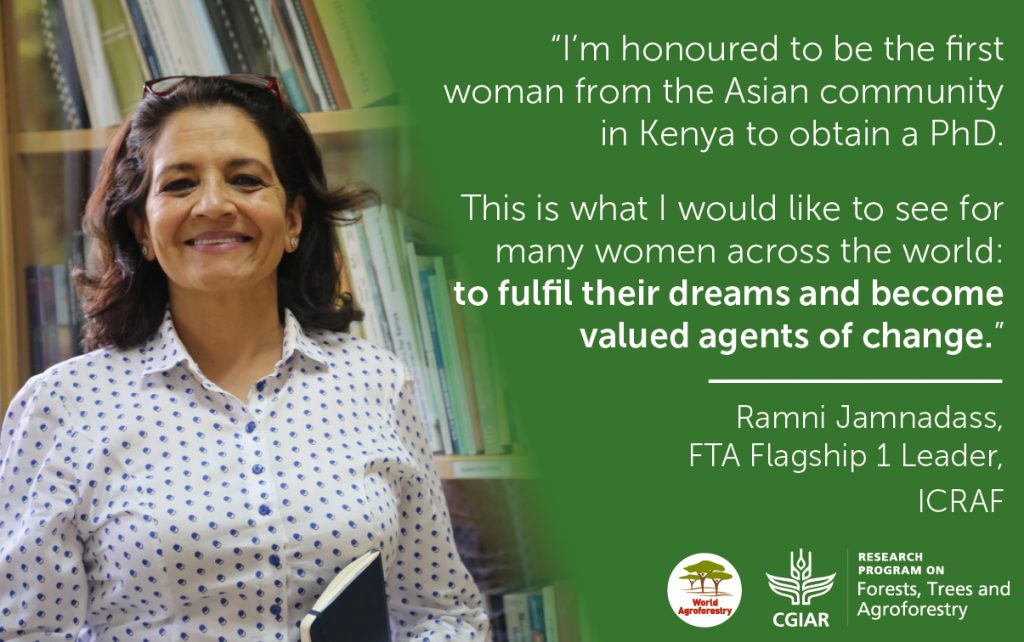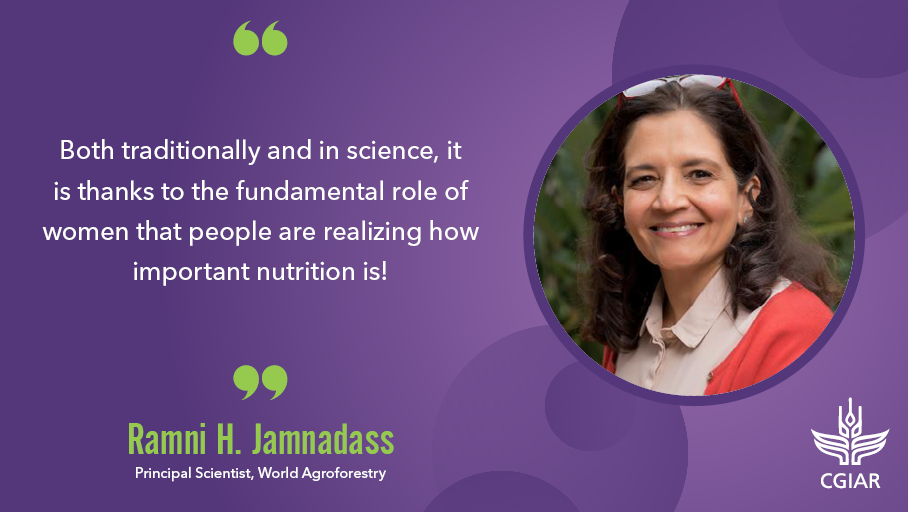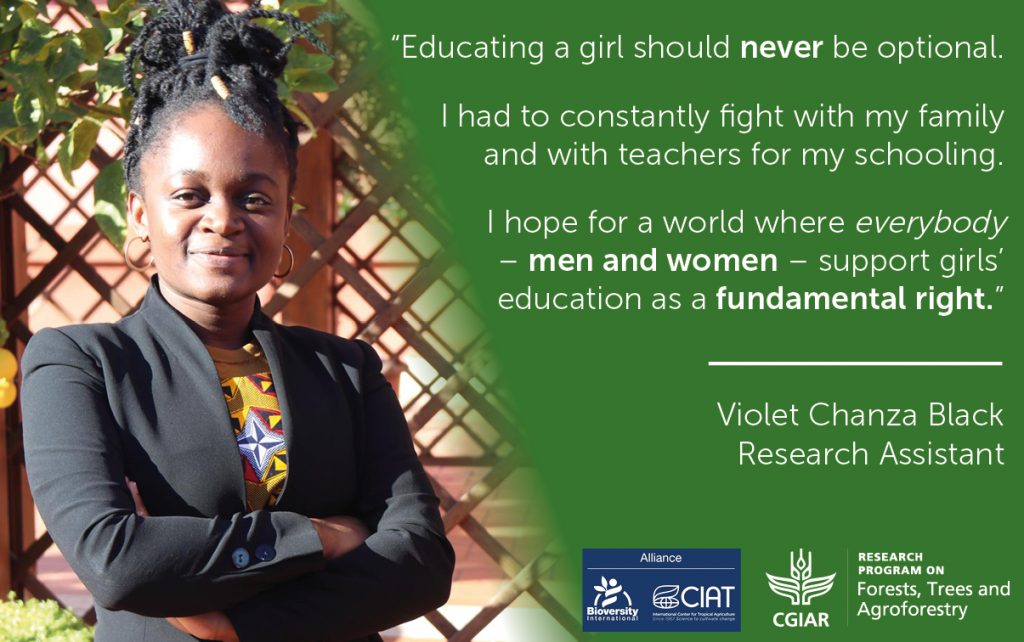For the international day of women and girls in science (11 February) FTA sent out statements from our Flagship 1 Leader Ramni Jamnadass and Violet Chanza Black, a gender research assistant at the Alliance of Bioversity International and CIAT. Both stories talked about the struggle and ultimately the empowerment that these women obtained through education.

Ramni shared her experience being the first woman from her community to obtain a PhD, something unseen before. Ramni’s long-standing fight to include nutrition in research is also featured in CGIAR’s gender campaign.

Violet’s statement was somewhat more provoking. It highlighted her personal struggle against both her teachers and her parents in obtaining a fundamental right: her education!

Her story was so compelling that we decided to find out more, and we contacted her for an interviewe. A video is also available, to help disseminate Violet’s story, as well as her views on gender equality. There is a lot to learn! This is a story of success, despite the odds – unfortunately so many girls around the world are not so fortunate. We hope this will inspire them never to give up fighting for their fundamental rights, and of course adults to always support them, all over the world.
Violet now holds an MSc in Development Economics, majoring in Human Development and Food Security from the University of Roma Tre. You may read her Master thesis here.
Interview full text
FTA – For the international day of women and girls in science you made a very strong statement, based on your personal experience [Educating a girl should never be optional…] – could you tell us more about it?
Violet Chanza Black – my story starts from one Saturday afternoon, I was at home tasked with making tea for a guest, my dad’s friend and as I served him his tea he asked me if I was still in school to which I happily responded yes and he turned to my father and said:
“If I had a daughter, I would never spend money on her school fees, because she is just going to get pregnant and then you waste all the money you spent on her school.”
I am a second born in a family of 8, four boys and four girls. I am the first daughter and that meant I was a “co-parent” when it comes to chores. Helping taking care of kids and cleaning, collecting water, firewood and cleaning. All of which had to be within my school day while my brother, even though he was older than me did not have to.
Primary school was fine, it was free, and the school provided us with free notebooks and pencils. All I needed was a school uniform.
I was selected to a public secondary school and I remember then I had to pay about 2$ per term and 6$ per year for my tuition fees. My brother went to a boarding school, which costed about 25 more times than my school and I remember he was never sent back home because he did not pay school fees, while I struggled to get my 2$. As a result, I would miss classes until well my father would give me the money to pay for school fees.
In school I remember one time my teacher wrote on my school report that “Violet likes hanging out with boys” which confirmed that theory that “she will just get pregnant and all the money would have been wasted and that made getting school fees even harder. I remember one of my teacher said to my friend “its good that you have pimples that way you will finish school.”
My message on the 11th of February was to shed some light on the power that teachers have to support students, also with their parents. Children who are in a similar situation as I was often face internal challenges within the household. Comments and general attitudes towards girls can really make them loose esteem or be encouraged.
FTA – When was the tipping point, when did your parents realize that you deserved the same education as your brother, despite what your teachers were saying?
VCB – My father always said go to school. It was until school wasn’t free that he was reluctant or unsure if he really wanted to spend that money on me. But when I didn’t go to school, he had me at home and I was nudging him… it was very annoying for him! Finally his reluctance was less strong than my determination!
FTA – What fueled your determination? It might be extremely hard to stand up to adult and community pressure, especially when you are so young?
My parents had separated by the time I went to secondary school and my mom was working for this woman who was working for Action Against Hunger. I looked up at her as a role model! That was a great source of inspiration for me. It made me realize that if I aspired at becoming like her, the only way I could achieve that was through education.
FTA – Well congratulations! Now you are the role model! How do you live up to this role?
VCB – Fom where I come the other issue is about poverty – so it’s not just about girls, it’s both girls and boys. How do you motivate a full community if no one is getting schooling, if they don’t have the basic needs? What I can do is to put myself in a place where they can talk to me, I reach out and I’m always there if they have questions. Another thing that is lacking is: information. You need to go to kids and tell them that education is possible, if they don’t see it as a possibility, they won’t desire it.
FTA- Did your personal experience bring you to focus on gender in your research?
VCB – I would say my personal experience is what keeps me going. I didn’t see any of my experience as it was happening that it was a gender issue. For me it was just happening. But my story allows me to relate to this topic and to the many people who are in a similar situation.
FTA – This year’s IWD theme is “I am Generation Equality: Realizing Women’s Rights” (or #GenerationEquality) and I think your story is strongly linked to this theme. Equality can be difficult however to define, because people are different, needs are different, contexts change, etc. There might be a thin line between equality and justice. What is your idea of equality?
When I hear the word equality, the first thing that should come to our mind is “equality of what?” Opportunities? Privileges? Different people are in different contexts, different situations. You cannot generalize. People are not homogeneous. I lend it from Amartya Sen’s Capabilities Approach: are people able to provide themselves food, shelter, clothing in a decent manner? I guess this is where we should all start from: Equality of access, equality of opportunities. It might be hard to achieve it, but there’s a lot we can do to help out someone else.
FTA- Any message you’d like to send out to all the women on this important day?
My wish for for all the women on International Women’s Day 2020: Individual Collectivism – we are all parts of one, if one of us is broken, we cannot make it to be whole. We are not free until we are all free. I think we all need to share, uplift and support in ways that we can other women and girls. Leaving no one behind.
As Martin Luther King said: “No one is free until we are all free.”
By the FTA Communication Team.
This article was produced by the CGIAR Research Program on Forests, Trees and Agroforestry (FTA). FTA is the world’s largest research for development program to enhance the role of forests, trees and agroforestry in sustainable development and food security and to address climate change. CIFOR leads FTA in partnership with Bioversity International, CATIE, CIRAD, INBAR, ICRAF and TBI. FTA’s work is supported by the CGIAR Trust Fund.











